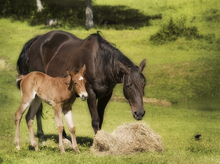As part of the Equine Guelph Colic Prevention Program, Equine Guelph offers the following October Colic Prevention Tip:
Feed Good Quality Feedstuff: As quality decreases (i.e. mature hay), it becomes 'more stemmy' and less digestible which can lead to impaction in the large intestine.

Assessing the colic risks of your horse
Equine Guelph offers their October Colic Prevention Tip: Feed good quality feedstuff: As quality decreases, hay becomes 'more stemmy' and less digestible which can lead to impaction in the large intestine.
Mouldy hay, more often associated with round bales, contains dust and mycotoxins (fungus) that can also increase the risk of colic.
Also available on the Equine Guelph website for the use of horse owners is their Colic Risk Rater that enables the horse owner to assess their horse's risk of colic.
The Colic Risk Rater provides a 'snapshot' in time of your horse’s risk of colic based on your current scenario. Risk factors may be constantly changing and your colic risk will change accordingly.
The Colic Risk Rater is a series of questions that will assess your horse’s risk of colic. There are a total of 31 questions in 10 sections and it will take you approximately 10 minutes to complete!
Colic risk rater factors
1. Turnout
2. Activity Level
3. Caregivers
4. Feeding
5. Water
6. Dental History
7. Parasite Management
8. Colic History
9. Other/Horse-Specific Factors
10. Change Assessment
As part of Equine Guelph’s ongoing effort to understand current management practices of horse owners, Equine Guelph is collecting data (responses only; no personal information) from the colic risk rater. At the end, you will have the option to submit your answers by clicking on the “submit” button. If you do not wish to have your answers collected, please disregard the “submit” button.
Please note: This information provides guidelines only and should never replace information from your veterinarian.
Check out Equine Guelph's new FREE Colic Risk Rater tool
